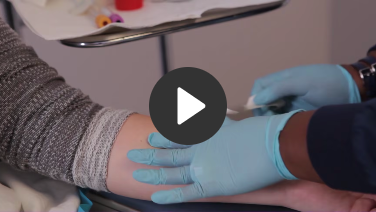USE AND IMPORTANT SAFETY INFORMATION
What is the most important information I should know about KRYSTEXXA® (pegloticase)?
Serious allergic reactions may happen in some patients who receive KRYSTEXXA. These allergic reactions can be life-threatening and usually happen within 2 hours of the infusion.
KRYSTEXXA should be given to you by a doctor or nurse in a healthcare setting where serious allergic reactions can be treated. Your doctor or nurse should watch you for any signs of a serious allergic reaction during and after your treatment with KRYSTEXXA.
Tell your doctor or nurse right away if you have any of these symptoms during or after your treatment with KRYSTEXXA:
- wheezing, shortness of breath, cough, chest tightness, chest pain, or trouble breathing
- dizziness, fainting, fast or weak heartbeat or feeling nervous
- reddening of the face, itching, hives, or feeling warm
- swelling of the throat or tongue, throat tightness, hoarse voice, or trouble swallowing
Who should not receive KRYSTEXXA?
Do not receive KRYSTEXXA if you:
- have a rare blood problem called glucose-6-phosphate dehydrogenase (G6PD) deficiency or favism. Your doctor may test you for G6PD before you start KRYSTEXXA.
- have had a serious allergic reaction to KRYSTEXXA or any of its ingredients. See the end of the Medication Guide for a complete list of ingredients in KRYSTEXXA.
What should I tell my doctor before receiving treatment with KRYSTEXXA?
Before you receive KRYSTEXXA, tell your doctor about all of your medical conditions, including if you:
- ever had any heart problems or high blood pressure.
- are pregnant or plan to become pregnant. It is not known if KRYSTEXXA will harm your unborn baby. Talk to your doctor if you are pregnant or plan to become pregnant.
- are breastfeeding or plan to breastfeed. It is not known if KRYSTEXXA passes into your breast milk. You and your doctor should decide if you will receive KRYSTEXXA or breastfeed.
Tell your doctor about all the medicines you take, including prescription and over-the-counter medicines, vitamins, and herbal supplements. Do not take any other uric acid lowering drug, such as allopurinol, febuxostat (Uloric), or probenecid, while receiving KRYSTEXXA.
KRYSTEXXA is recommended to be given with another prescription medicine called methotrexate. KRYSTEXXA may also be used alone. You and your doctor will decide the treatment that is right for you.
Prior to your treatment with KRYSTEXXA, your doctor may give you medicine to help reduce your risk of getting gout flares or an allergic reaction. Take these medicines as directed by your doctor or nurse. Your doctor will also test your uric acid levels prior to each treatment to monitor your response to KRYSTEXXA.
Your gout flares may increase in the first 3 months when you start receiving KRYSTEXXA. It’s important to understand that this is happening because KRYSTEXXA is breaking down uric acid in your body. Do not stop receiving KRYSTEXXA even if you have a flare, as the amount of flares will decrease after 3 months of treatment. Your doctor may give you other medicines to help reduce your gout flares for the first few months after starting KRYSTEXXA.
What are the possible side effects of KRYSTEXXA?
In KRYSTEXXA clinical trials:
The most common side effects of KRYSTEXXA when given together with methotrexate were gout flares, joint pain, coronavirus disease 2019 (COVID-19), nausea, and fatigue.
The most common side effects of KRYSTEXXA were gout flares, allergic reactions (including infusion reactions). See “What is the most important information I should know about KRYSTEXXA?”, nausea, bruising, sore throat, constipation, chest pain, coronavirus disease 2019 (COVID-19), and vomiting.
This is not a complete list of all possible side effects. Call your doctor for medical advice about side effects.
You are encouraged to report negative side effects of prescription drugs to the FDA. Visit www.fda.gov/safety/medwatch or call 1-800-FDA-1088.
For additional Important Safety Information, please see the Medication Guide and discuss with your doctor.
USE
KRYSTEXXA is a prescription medicine used in adults to help reduce the signs and symptoms of gout that are not controlled by other treatments.
KRYSTEXXA is not for use in people with too much uric acid in their bodies who do not have symptoms (asymptomatic hyperuricemia).













